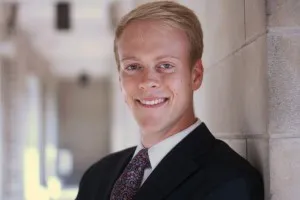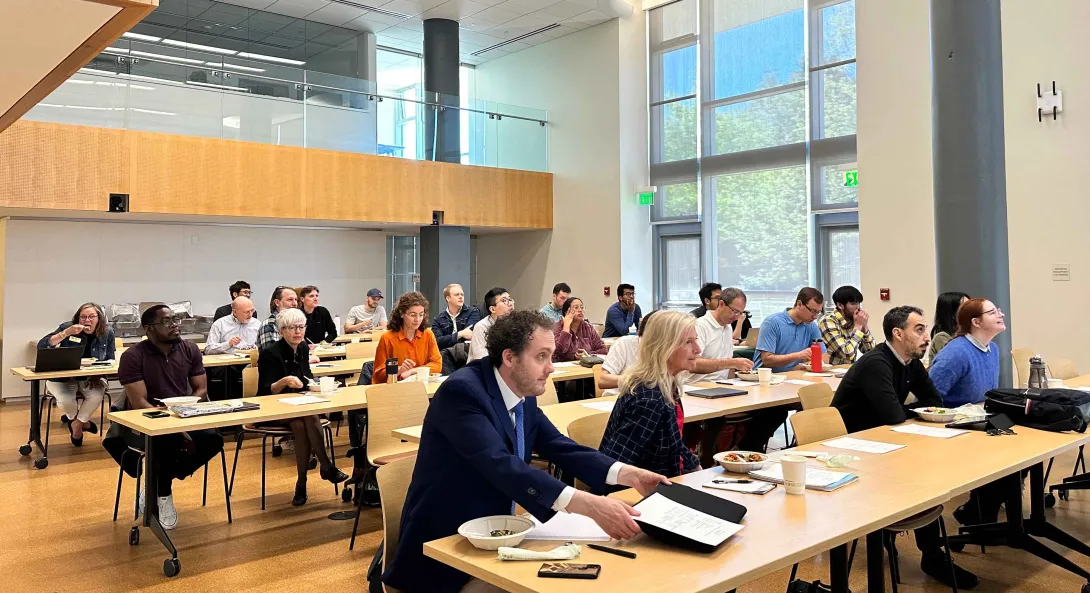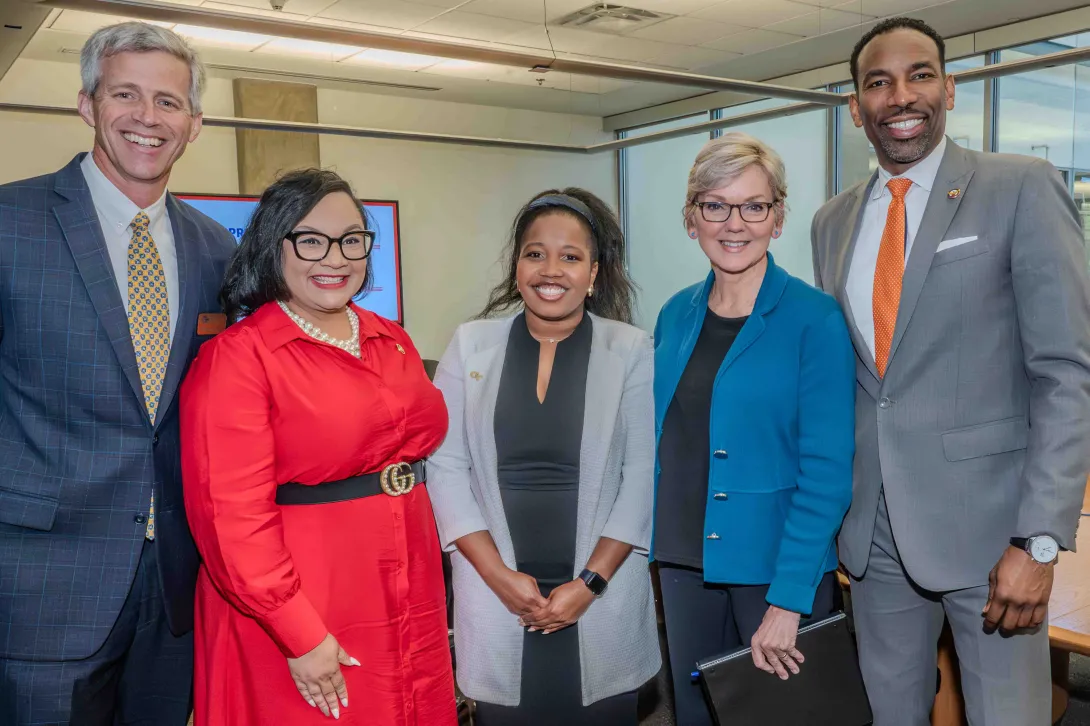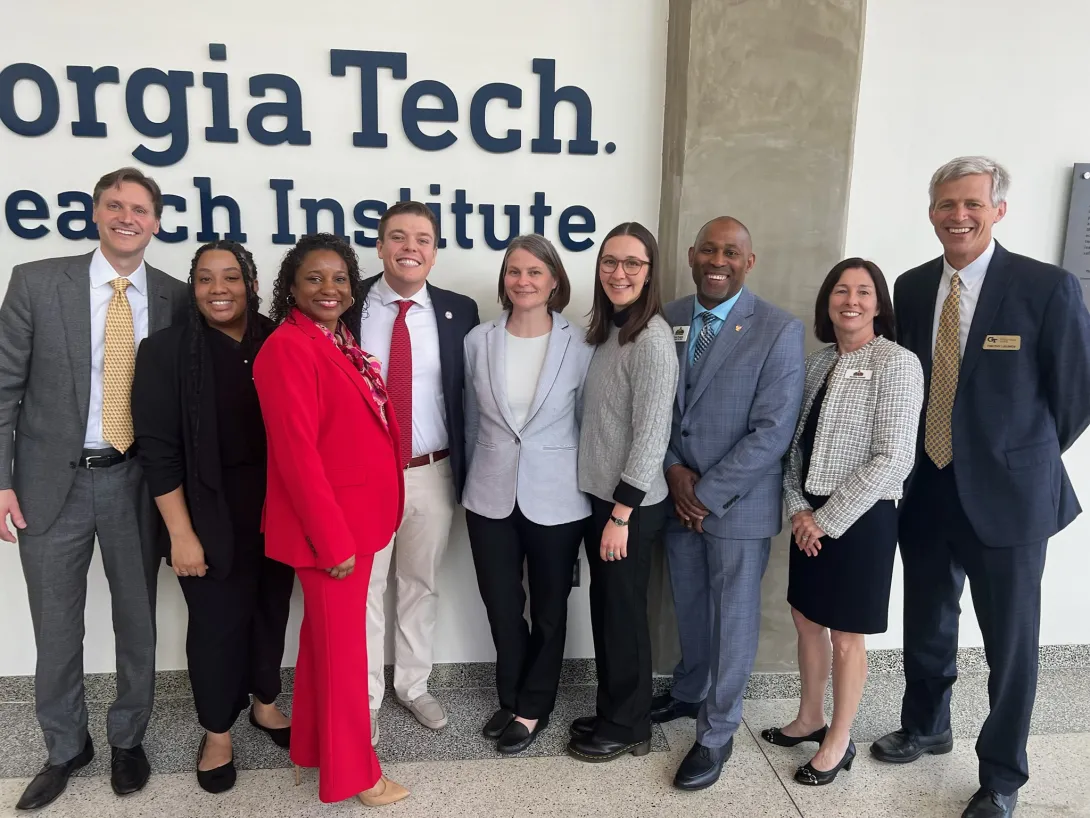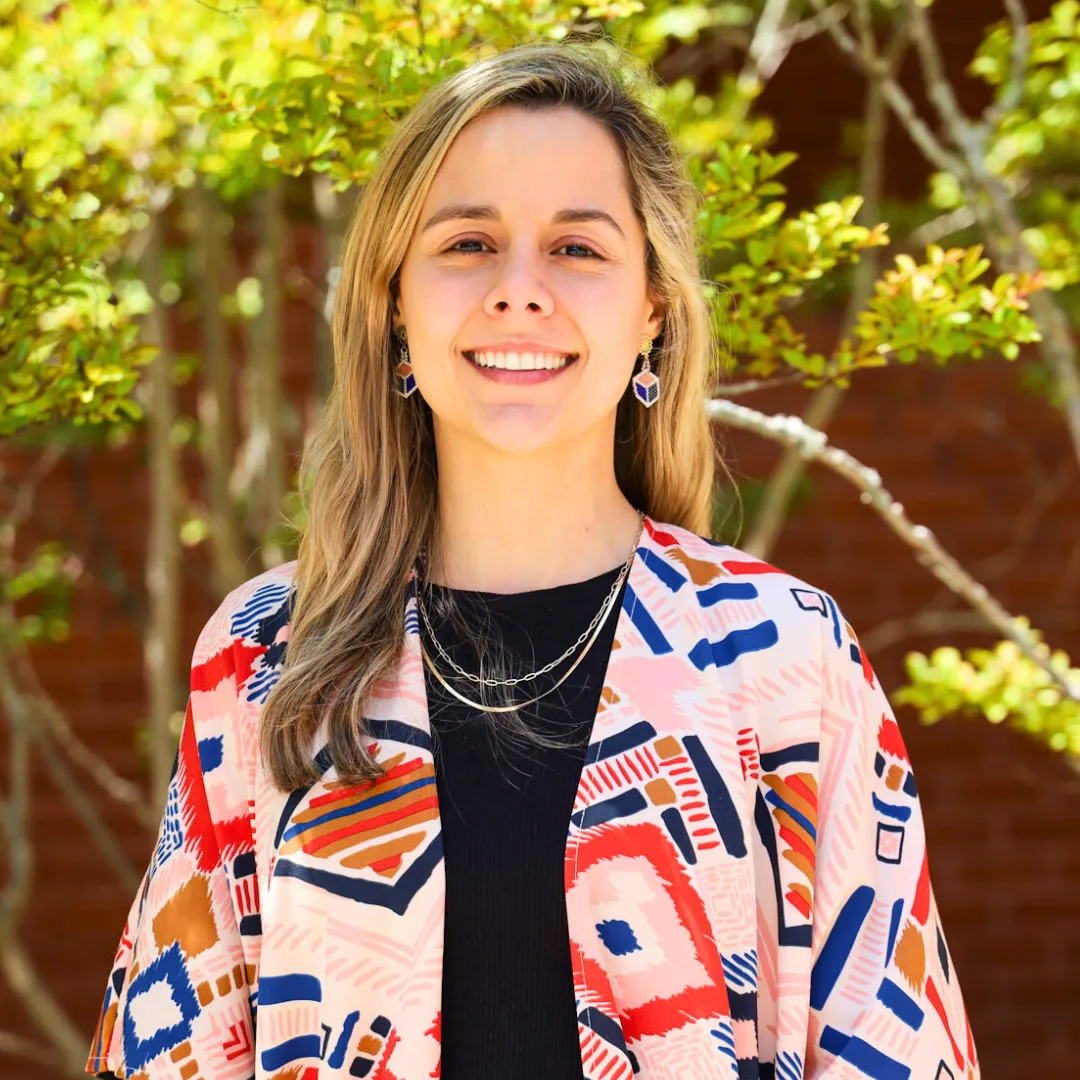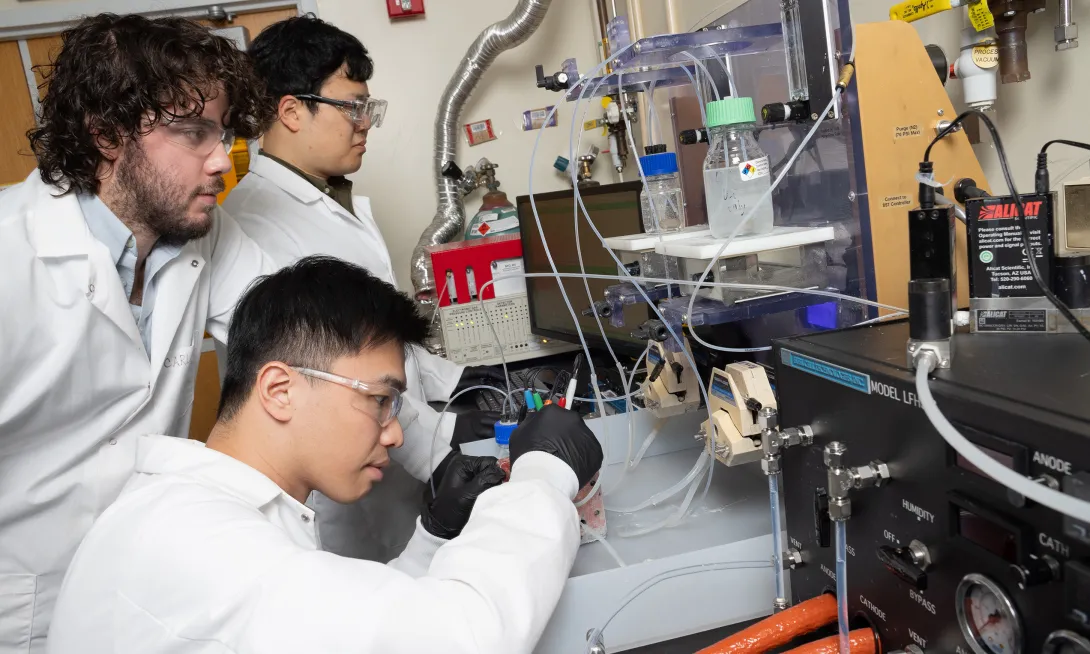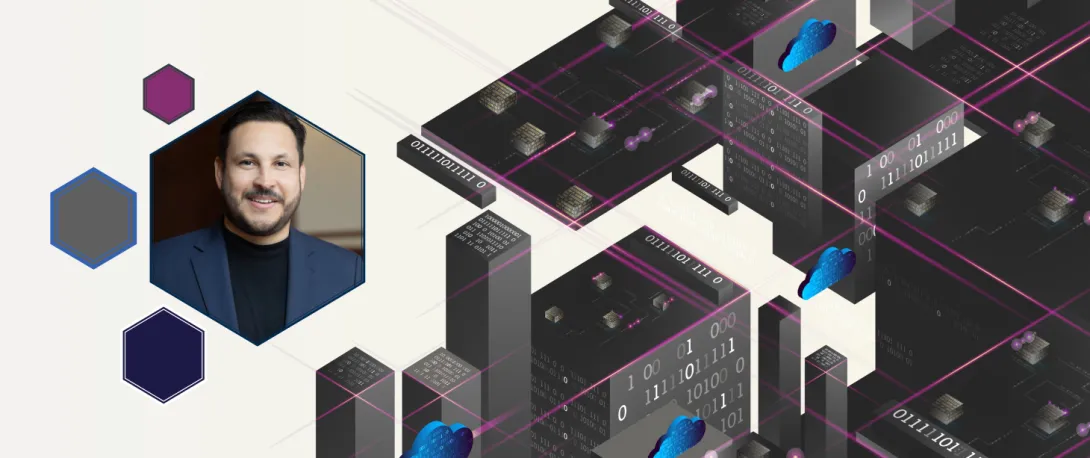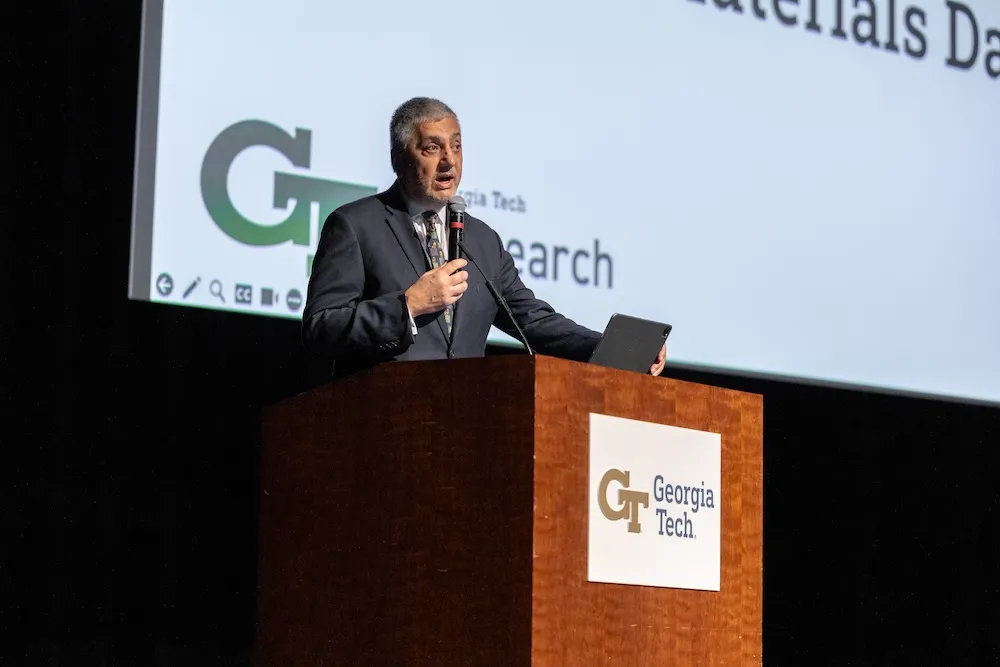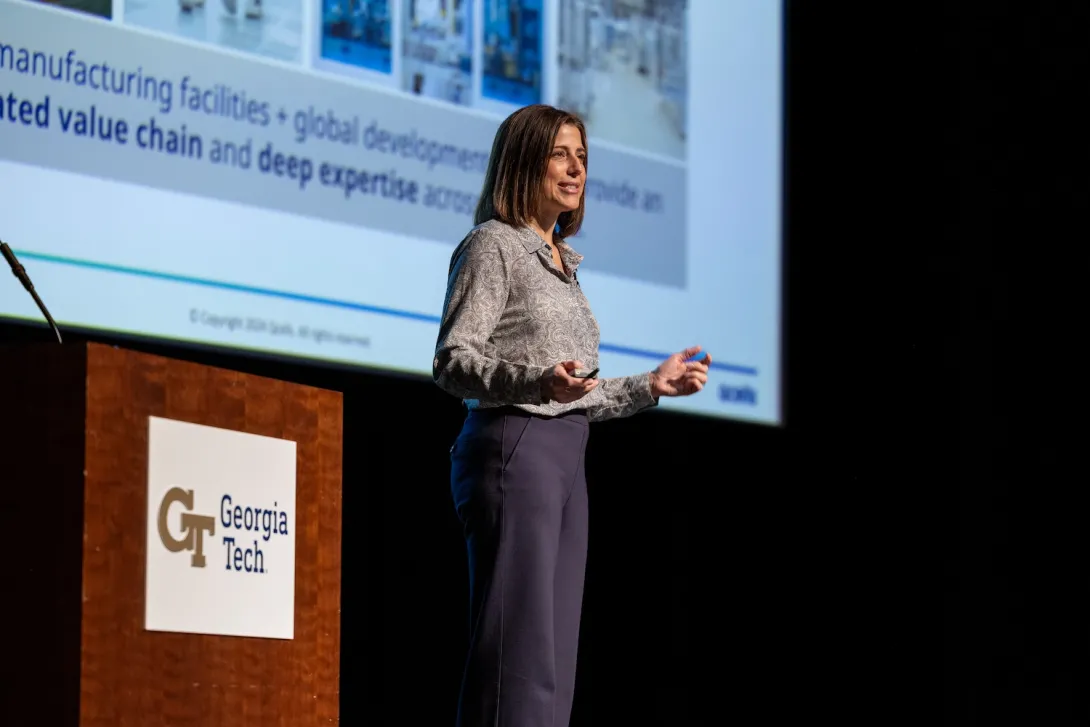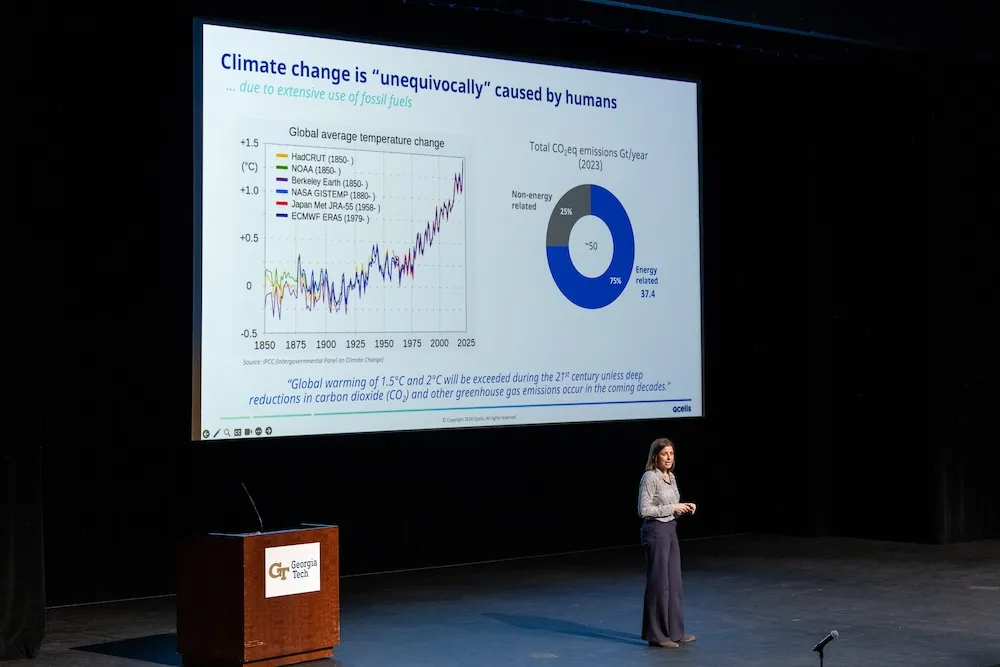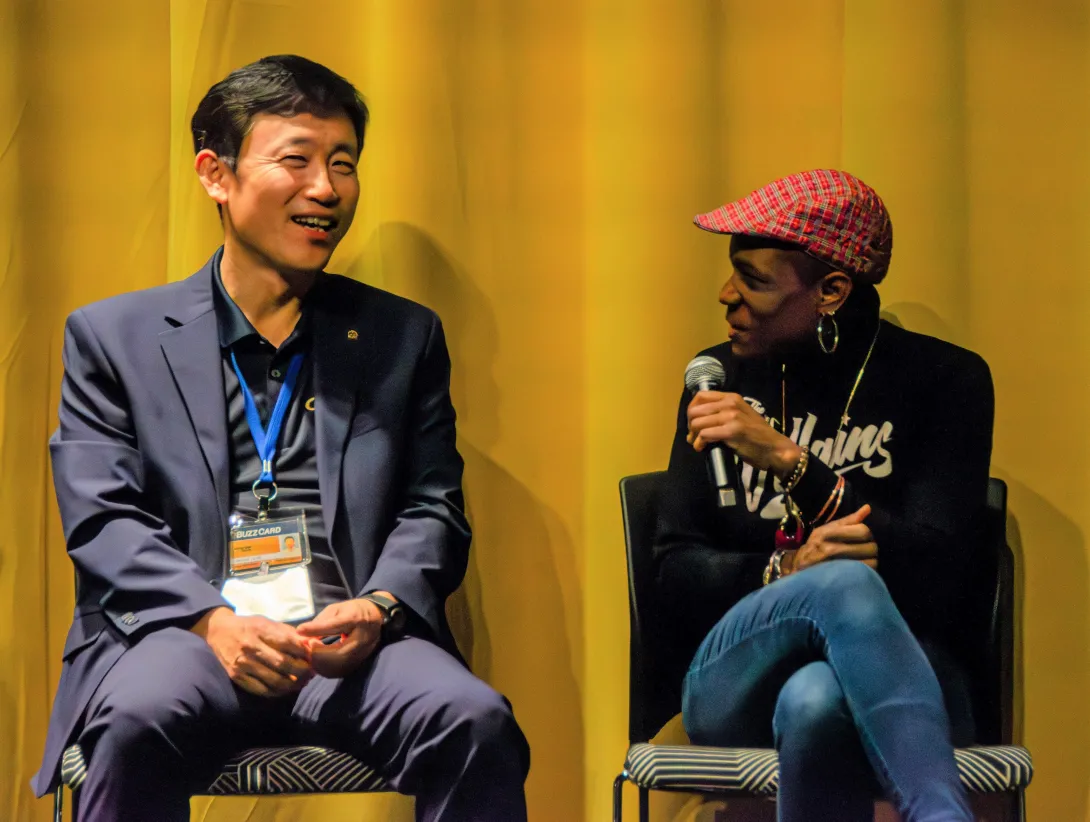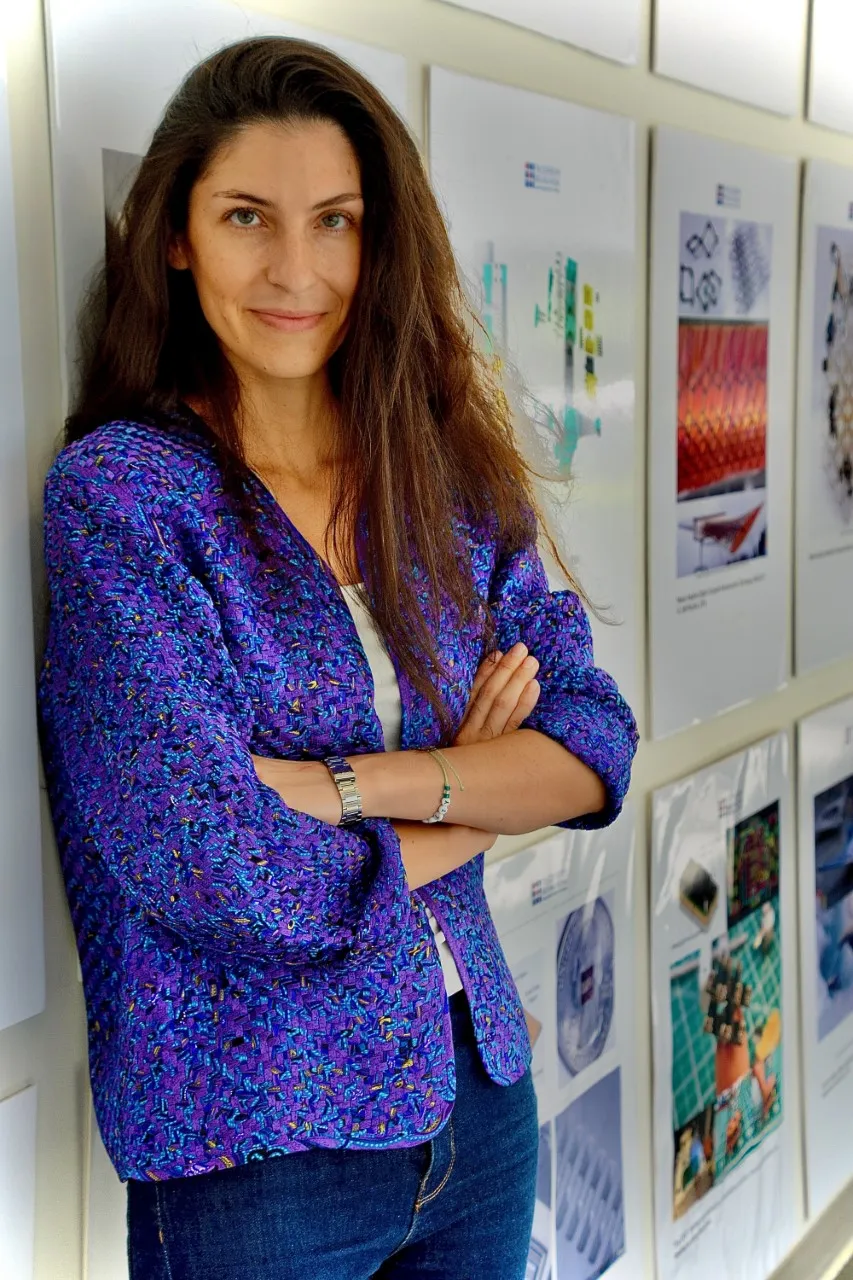May. 06, 2024
Are you under the impression that air pollution is a dichotomous problem where the air is either polluted or it’s not? What else is there to know about air pollution? The surprising answer to this question lies not with a lab scientist but with an economist.
Assistant Professor Dylan Brewer of the School of Economics studies the health impacts of air pollution and the statistical methods useful for teasing apart factors that can confound those answers, all from the lens of an economist. It turns out that viewing the problem of air pollution through an economic framework and applying statistical methods commonly used in the field of economics can shed light on the multiple factors that influence the health impact of exposure to air pollution on different populations.
Recently, Brewer was the featured guest on the podcast The Health Deli, where the hosts were surprised to find an economist making waves at this critical research intersection. Brewer explains why viewing this problem from the perspective of an economist is so valuable and discusses some of his research team’s surprising findings.
The podcast, hosted by three pharmacists, approaches health news from a scientific bent, which turned out to be a great fit for an economist who studies air pollution. You can listen to the podcast episode, “Is It Safe To Breathe Air? How Is This a Real Question?’ on Apple Podcasts or Spotify, as well as other major podcast providers.
Spotify Link https://open.spotify.com/episode/1PDPUZNGEifWA5IvCnVUNK
News Contact
Written by: Sharon Murphy, Research Associate, SEI
News Contact:
Priya Devarajan, SEI Communications Program Manager
May. 03, 2024
On April 12, the Energy, Policy, and Innovation Center (EPICenter) hosted its second round of the “Friday Lightning Talk Series” at the Scholars Event Network space in the Price Gilbert Library.
Eight multidisciplinary participants from Georgia Tech, including postdoctoral students, graduate students, research faculty, and research associates from public policy, economics, electrical and computer engineering, industrial and systems engineering, and EPICenter, presented an overview of an energy-related research project during the session.
Laura Taylor, chair of the School of Economics and interim director of EPICenter, introduced the organization’s new faculty affiliate program through which affiliates, their students, and postdocs present and share research ideas and receive feedback from the audience.
Topics covered during the session included understanding the social costs of natural gas deregulation, managing EV charging during emergencies, exploring whether daylight saving time saves energy, the green energy workforce, the effects of community solar on household energy use, the Atlanta Energyshed project, clean hydrogen production in Georgia, and household responses to grid emergencies.
The interactive session was well attended with over 25 attendees asking thought-provoking questions and providing suggestions on future areas to explore.
The first round was held on March 1 and was such a success that this second round had a full slate of presenters and a full house of audience members. The agendas for both lightning round talks are available below, along with links to presentation slides.
A unit of the Strategic Energy Institute of Georgia Tech, EPICenter’s mission is to conduct rigorous research and deliver high-impact insights that address the energy needs of the southeastern U.S., while keeping a national and global perspective. EPICenter calls upon broad, multidisciplinary expertise to engage the public and create solutions for critical emerging issues as our nation’s energy transformation unfolds.
News Contact
Priya Devarajan || SEI Communications Program Manager
May. 01, 2024
On a recent visit to the Georgia Tech campus, Secretary of Energy Jennifer Granholm announced that a tri-city alliance of Atlanta, Decatur, and Savannah in partnership with Georgia Tech will receive funding to drive clean energy solutions.
The funding is part of DOE’s Energy Future Grants program, and the Atlanta-Decatur-Savannah partners will receive $500,000 during the planning phase to develop initiatives, policies, and tools to promote green energy deployment in their communities. In total, the grants will provide $27 million in financial and technical assistance to support strategies that increase resiliency and improve access to affordable clean energy. The team will compete with other recipients for additional funding in subsequent phases of the program.
The Georgia Energyshed (G-SHED) team, led by Richard Simmons of the Strategic Energy Institute, will partner with the tri-city team in this project. The modeling and simulation-driven analysis from G-SHED will be used by the Tri-City Alliance project to develop deployment-ready blueprints of clean energy innovations focused on community benefits.
The G-SHED team, formed through another DOE grant, is developing a metropolitan energy planning organization informed by an integrated modeling effort that includes technical, social, and community inputs. Georgia Tech is collaborating with the Atlanta Regional Commission and the Southface Institute in this project.
Granholm said announcing the funding at Georgia Tech was fitting because its tools “are going to be magnificent for this project for communities to decide the best path for them based on data.” Atlanta Mayor Andrew Dickens, U.S. Rep. Nikema Williams, and several other dignitaries were present during the announcement. Secretary Granholm toured parts of the Georgia Tech campus including the Carbon Neutral Energy Solutions building during her visit.
“It’s exciting when the Secretary of Energy makes a special trip to campus to announce a new Award. I appreciate Secretary Granholm and the Department of Energy for enabling this innovative energy partnership with Atlanta, Decatur, and Savannah,” said Tim Lieuwen, executive director of the Strategic Energy Institute.
News Contact
Priya Devarajan || SEI Communications Program Manager
Apr. 26, 2024
"Engineering solutions should not only solve problems but also address the societal and environmental impacts they create," states Professor Sofia Perez-Guzman, emphasizing the holistic approach to engineering at Georgia Tech.
Perez-Guzman's philosophy underscores her dual roles in the School of Civil and Environmental Engineering (CEE) and the H. Milton Stewart School of Industrial and Systems Engineering(ISyE).
In her roles, she applies her comprehensive academic background to deepen the understanding of engineering’s broader implications, focusing on how these fields impact society and the environment.
Academic Steps in Resilient Engineering
Perez-Guzman's scholarly journey originated in Colombia at the Universidad del Valle, where she earned a Bachelor's degree in Industrial Engineering.
Her academic ambition propelled her to the United States, where she pursued a Master's degree in Transportation Engineering and a Master’s degree in Economics at Rensselaer Polytechnic Institute (RPI).
During her Master's studies, she engaged in research focused on the economics of freight transportation and its role in food deserts. She developed an analytical model to understand the formation of areas underserved by food supply chains.
Perez-Guzman's educational achievements culminated in a Ph.D. in Transportation Engineering from RPI in December 2022.
Her doctoral thesis centered on the realm of disaster response logistics, where she created humanitarian (beneficiary-oriented) analytical models for the distribution of relief goods in post-disaster scenarios.
Emphasizing her unwavering commitment to enhancing the robustness and sustainability of supply chains, Perez-Guzman aims to bridge the divide between traditional responses and visionary foresight.
Research and Teaching Pedagogy
Her current research explores the societal impact of supply chains, specifically through the lens of freight transportation.
This work seeks to develop decision-making support tools that address complex societal challenges where freight transportation plays a crucial role in either contributing to societal issues or helps in facilitating solutions.
In the classroom, Perez-Guzman translates these complex research themes into digestible, actionable lessons. She is currently instructing an undergraduate course dedicated to Multimodal Transportation and is set to introduce a new graduate course on Freight Transportation in the Spring semester.
"Our focus must be on developing research that is not only theoretically robust but also practical and implementable for those deploying these solutions in real-world scenarios. By understanding the needs of end-users and delivering tools that practitioners can readily employ, we move one step closer to making a tangible impact on the field."
Transitioning from theory to practice, she envisions her students as future leaders who’ll prioritize long-term sustainability and resilience in their professional endeavors, contributing to the creation of smarter, more adaptable transportation systems and supply chains systems globally.
Molding Holistic Supply Chain Leaders
Amidst these advanced theoretical and practical frameworks, Perez-Guzman encourages her students to further personalize their educational journey.
For students aiming to propel their career in Supply Chain management, Perez-Guzman encourages students to specialize and excel in a specific interest area.
"Dive deeper into your studies and seek out academic challenges beyond the syllabus. Engaging in competitions and embracing every learning opportunity your institution offers can equip you with a distinctive advantage. Remember, the aim is to distinguish yourself with specialized knowledge or skills.”
Additionally, Perez-Guzman emphasized a crucial blend of technical prowess and soft skills for students venturing into supply chain management.
"Georgia Tech students boast exceptional technical skills, a point that's well acknowledged. However, there's an increasing need for them to also focus on developing their soft skills, like communication, both oral and written. Modern companies seek more than just outstanding coders or data scientists; they require professionals who can translate complex theories, algorithms, and results into digestible content which is essential for decision-making. Therefore, it's crucial for our students to develop these soft skills to fully meet the interdisciplinary needs of the future."
Author: Atharva Anand Dave
Apr. 25, 2024
Engineers at Georgia Tech have designed a process that converts carbon dioxide removed from the air into useful raw material that could be used for new plastics, chemicals, or fuels.
Their approach dramatically reduces the cost and energy required for these direct air capture (DAC) systems, helping improve the economics of a process the researchers said will be critical to addressing climate change.
The key is a new kind of catalyst and electrochemical reactor design that can be easily integrated into existing DAC systems to produce useful carbon monoxide (CO) gas. It’s one of the most efficient such design ever described in scientific literature, according to lead researcher Marta Hatzell and her team. They published details April 16 in Energy and Environmental Science, a top journal for energy-related research.
News Contact
Joshua Stewart
College of Engineering
Apr. 22, 2024
With new vehicle models being developed by major brands and a growing supply chain, the electric vehicle (EV) revolution seems well underway. But, as consumer purchases of EVs have slowed, car makers have backtracked on planned EV manufacturing investments. A major roadblock to wider EV adoption remains the lack of a fully realized charging infrastructure. At just under 51,000 public charging stations nationwide, and sizeable gaps between urban and rural areas, this inconsistency is a major driver of buyer hesitance.
How do we understand, at a large scale, ways to make it easier for consumers to have confidence in public infrastructure? That is a major issue holding back electrification for many consumer segments.
- Omar Asensio, Associate Professor at Georgia Institute of Technology and Climate Fellow, Harvard Business School | Director, Data Science & Policy Lab
Omar Asensio, associate professor in the School of Public Policy and director of the Data Science and Policy Lab at the Georgia Institute of Technology, and his team have been working to solve this trust issue using the Microsoft CloudHub partnership resources. Asensio is also currently a visiting fellow with the Institute for the Study of Business in Global Society at the Harvard Business School.
The CloudHub partnership gave the Asensio team access to Microsoft’s Azure OpenAI to sift through vast amounts of data collected from different sources to identify relevant connections. Asensio’s team needed to know if AI could understand purchaser sentiment as negative within a population with an internal lingo outside of the general consumer population. Early results yielded little. The team then used specific example data collected from EV enthusiasts to train the AI for a sentiment classification accuracy that now exceeds that of human experts and data parsed from government-funded surveys.
The use of trained AI promises to expedite industry response to consumer sentiment at a much lower cost than previously possible. “What we’re doing with Azure is a lot more scalable,” Asensio said. “We hit a button, and within five to 10 minutes, we had classified all the U.S. data. Then I had my students look at performance in Europe, with urban and non-urban areas. Most recently, we aggregated evidence of stations across East and Southeast Asia, and we used machine learning to translate the data in 72 detected languages.”
We are excited to see how access to compute and AI models is accelerating research and having an impact on important societal issues. Omar's research sheds new light on the gaps in electric vehicle infrastructure and AI enables them to effectively scale their analysis not only in the U.S. but globally.
- Elizabeth Bruce, Director, Technology for Fundamental Rights, Microsoft
Asensio's pioneering work illustrates the interdisciplinary nature of today’s research environment, from machine learning models predicting problems to assisting in improving EV infrastructure. The team is planning on applying the technique to datasets next, to address access concerns and reduce the number of “charging deserts.” The findings could lead to the creation of policies that help in the adoption of EVs in infrastructure-lacking regions for a true automotive electrification revolution and long-term environmental sustainability in the U.S.
- Christa M. Ernst
Source Paper: Reliability of electric vehicle charging infrastructure: A cross-lingual deep learning approach - ScienceDirect
News Contact
Christa M. Ernst
Research Communications Program Manager
Topic Expertise: Robotics | Data Sciences| Semiconductor Design & Fab
Research @ the Georgia Institute of Technology
christa.ernst@research.gatech.edu
Apr. 16, 2024
More than 400 people participated in Energy Materials Day on March 27, as researchers and industry leaders came together to discuss and advance energy materials technologies such as solar energy, carbon-neutral fuels, and batteries.
Energy materials are the things — natural, manufactured, or both — that aid the use of energy. They also play a key role in developing cleaner, more efficient energy solutions.
Energy Materials Day was co-hosted by Georgia Tech’s Strategic Energy Institute (SEI), the Institute for Materials (IMat), and the Georgia Tech Advanced Battery Center. The event evolved out of last year’s Georgia Tech Battery Day.
“As an engine of innovation in science and technology, Georgia Tech has incredible opportunities and the responsibility to conduct research to benefit society,” said Chaouki Abdallah, executive vice president for Research at Georgia Tech. “We call this ‘research that matters.’”
Events like Energy Materials Day are part of an ongoing, long-range effort to position Georgia Tech, and Georgia, as a go-to location for modern energy companies. Tech was recently ranked by U.S. News & World Report as the top public university for energy research. Abdallah also outlined why Georgia Tech, with more than 1,000 researchers across campus working in the energy space, is a natural fit for events that foster collaboration between the public and private sectors.
“Right here, right now, we have the opportunity to harness our collective powers, our collective knowledge, our collective resources to become a global engine of innovation,” he said.
Plenary speaker Danielle Merfeld, global chief technology officer at QCells, highlighted opportunities for the current and future clean energy infrastructure in the United States.
"At the heart of our discussions today [are these questions]: What is new technology, and how do you make it ... and make it at scale, in an affordable, accessible, and reliable way?” she said.
"... [The] good news is this country has taken a very deliberate step toward creating the most robust industrial policy we've had in decades. ... This is driving opportunity and creating the foundation for manufacturing. So, [we can] use that industrial base of making and consuming power [and] decarbonize the electric grid by 2035...."
“Events like this are so important to forwarding progress in research and industry,” said Eric Vogel, IMat’s executive director. “It’s important to bring together professionals throughout the industry to keep these lines of communication open.”
The day was divided into three tracks: battery materials and technologies, photovoltaics and the grid, and materials for carbon-neutral fuel production. Attendees were encouraged to listen to talks from all three areas. Each track included academic speakers who shared their research and private-sector speakers who described how technological advancements are affecting the industry.
“With its rich history in energy research, Georgia Tech remains a leader in addressing global energy challenges,” said Tim Lieuwen, executive director of SEI. “The success of Energy Materials Day is encouraging, and I eagerly anticipate continuing these discussions in 2025.”
News Contact
Amelia Neumeister
Research Communications Program Manager
Apr. 11, 2024
The Center for Sustainable Communities Research and Education (SCoRE — formerly SLS), in collaboration with the Strategic Energy Institute (SEI), the Brook Byers Institute for Sustainable Systems (BBISS), the Renewable Bioproducts Institute (RBI), and the Social Equity and Environmental Engineering Lab (SEEEL), launched the Energy Equity, Environmental Justice, and Community Engagement Faculty Fellows Program in November 2023. In this program, Georgia Tech faculty learn how to work with communities, bringing together their academic knowledge and the local expertise of communities that has been developed through lived experience and long-standing social action.
The inaugural fellows include 24 Georgia Tech faculty from five Colleges, as well as a faculty colleague from Georgia Gwinnett College and a partner from the Southeast Energy Efficiency Alliance, who are building relationships with each other and with community partners in the areas of energy equity and environmental justice. Since the launch, they have engaged in a wide array of events, including community benefit and development workshops, site visits to community-based organizations across the Atlanta region, and university-community gatherings and symposia.
The program is expected to result in both collective and individual deliverables. Collective deliverables include the development of network mapping tools to facilitate collaborations inside and outside Georgia Tech, a set of principles for conducting community-engaged research, a reflective essay on faculty training for community-engaged research, and ideas for future activities to facilitate university-community and interdisciplinary team formation. Fellows individually determine their deliverables, which run the gamut from exploring partnerships for a specific research project to writing a societal impact statement for a tenure package.
More broadly, the program aims to grow Georgia Tech’s collaborative expertise in community-engaged research by forming a supportive network of faculty interested in community-engaged sustainability research and education.
Faculty Affiliate: Patritsia Stathatou, Research Scientist, Renewable Bioproducts Institute, Georgia Tech
Sustainable energy sources and environmental justice go hand in hand. Although such technologies aim to minimize environmental impacts of modern societies, without considering issues of environmental justice and energy equity, these solutions can inadvertently perpetuate disparities by disproportionately benefiting certain communities while harming others. Bridging the gap between technological advancements and community benefits is paramount to creating an equitable energy future for all.
This program provides a unique opportunity to explore these interconnections, enhancing my knowledge in integrating community values and concerns into my research on alternative fuels and renewable energy sources. I am particularly excited about the hands-on approach of the program, which emphasizes listening sessions and workshops, allowing fellows to gain direct insights from various stakeholders. I hope that, through active participation in these sessions, I can further my understanding of the challenges faced by local communities and incorporate these insights into actionable solutions in my research.
In my project, I'm in a group crafting a reflective essay about our experiences with Community Engaged Research training. Our goal is to translate the insights gained from this pilot program into a publishable piece. Additionally, I'm acquiring valuable insights into the development of Broader Impact Statements and Community Benefits Plans, crucial parts of proposals for securing federal funding from NSF and DoE, respectively.
Faculty Affiliate: Sofia Perez-Guzman, Assistant Professor, School of Civil and Environmental Engineering, Georgia Tech
The fellowship program has been a fantastic experience. I never imagined how much I would learn from this program about properly engaging with communities. As researchers, we might think we want to hear the needs that communities face to provide them with solutions. That is different than the way community-driven research should work. I’ve learned that researchers need to gain the communities’ trust, be present and participate in their events, and, more importantly, work at their pace and for their interests rather than push our research agendas for our professional benefit. I know there is still a lot more I must continue learning, but what I’ve learned so far has been an eye-opener that is making me rethink how to approach my research and its social aspect.
My project focuses on the social performance of supply chains, and I am seeking to put more emphasis on the “social” part of my research by making it more community-driven. That is why I applied for the fellowship. I am advancing two current projects as part of the fellowship. One relates to increasing food accessibility to vulnerable populations via community-driven freight transportation solutions. I want to bring food closer to people and do it by co-designing solutions with the communities. The second project relates to forming a team to pursue research on enhancing community resilience to extreme weather events for the mobility of people and goods. The fellowship and a Sustainability Next seed grant from BBISS are helping me move forward with this project.
News Contact
Priya Devarajan
Research Communications Program Manager || SEI | RBI
Apr. 03, 2024
Continued growth will transform metro Atlanta, and the Atlanta Regional Commission (ARC) projects 1.8 million new residents across the 21-county region by 2050.
The increase would bring the regional population to 7.9 million, but to accommodate that growth, Georgia Tech experts say improvements in the housing, transportation, and labor markets must be made.
Housing
The five-county core around Atlanta — Fulton, Gwinnett, Cobb, DeKalb, and Clayton — will account for nearly half of the new residents and continues to grow. Gregory Randolph, an assistant professor in Georgia Tech’s School of City and Regional Planning, says the region must start by reexamining its approach to urbanism as new census data shows Atlanta has become the sixth most-populated metro area in the country.
"For the second half of the 20th century, little of the population growth in metro Atlanta was happening in the City of Atlanta, but that has changed over the past two decades. With the urban core growing, we have an opportunity. to pursue a different kind of urban form that is higher density and more walkable. A lot of the recent growth in Atlanta is adding density without necessarily improving the quality of urbanism.”
He explains that, especially in downtown Atlanta, retrofitting existing properties will play a key role in transforming neighborhoods through the replacement of "lower-value infrastructure," such as surface parking lots, with higher-density housing. In a post-pandemic environment, the conversion of office space to mixed-use properties is emerging as a strategy in urban areas like Atlanta.
A 2023 report identified the need for 391,878 housing units within the five-county core at the current population level. Mike Dobbins, professor of the practice in the School of City and Regional Planning, credits efforts made by the mayor's office and nonprofit organizations such as the Urban Land Institute to increase availability.
"We're living in a situation where housing values are too high because big money investors are bidding up real estate prices throughout the region. Even nationally, it's double the rate of wage increases. The biggest question is how can we bring down housing costs,” he said.
Randolph and Dobbins agree that addressing Atlanta’s housing needs is more complicated than simply adding supply.
“Our priority must be building housing that is affordable to low- and middle-income households, and in a way that promotes mixed-income, walkable neighborhoods with equitable, car-free access to amenities like parks, schools, and community-serving retail,” Randolph said.
Labor
Along with population growth, the region will add an estimated 856,000 jobs, with significant gains in healthcare, technology, and waste management. To maintain a labor force that can fill the jobs of the future, Dobbins stresses that continued investment in K-12 education, especially in traditionally underserved communities, is vital to accommodate new growth and overcome existing challenges of inequity.
Atlanta has the highest income inequality in the nation. According to the Atlanta Wealth Building Initiative, the average white family’s median income is $83,722 compared to $28,105 for Black families and $43,110 for Latino families. That gap widens when examining wealth, which for white households is 46 times higher than that of Black households in Atlanta.
The ARC study notes that "virtually all the net growth will come from racial and ethnic minority groups.” Randolph points to policy as a necessary tool in improving workforce development for current and future residents to support equitable and inclusive growth across the region. He adds that institutions like Georgia Tech can play a role in expanding access to the advanced degrees often needed to fill the jobs created by the city’s emerging status as a technology hub, with an emphasis on ensuring access to these degrees among historically disadvantaged groups in the city.
Transportation
The other 900,000 projected new residents will reside among the remaining 16 counties in the Atlanta region. The ARC predicts the most rapid growth in Forsyth, Barrow, Paulding, Cherokee, Walton, and Coweta, and the need for affordable housing will extend to the surrounding counties, as will the need to travel throughout the region.
Ryan Gravel, the Georgia Tech alumnus and mind behind the Atlanta BeltLine, says transit improvements are needed to ensure each county is connected to Atlanta’s city center.
“We haven't made a substantial new transit investment since 2000,” he said. “Meanwhile, the region has grown substantially since then. We haven't been laying the foundation for that future growth, which means it will come in ways that we don't want: more traffic, more congestion, and more inequities in communities of color.”
Gravel, founder of the consulting firm Sixpitch, rejects adding lanes to existing highways, saying that strategic improvements to MARTA — the rail system constructed in 1979 — will reduce traffic while allowing residents to live outside of the five-county core.
“As the saying goes, the best time to plant a tree is 20 years ago,” he said. “The second-best time is now. We didn’t do it 20 years ago, but we could start now.”
In his 2024 State of the City address, Dickens announced plans to construct a new MARTA rail station on the Southside at the Murphy Crossing redevelopment project site, connecting the system to Beltline for the first time. The mayor revealed preliminary plans to add three infill MARTA stations throughout the city, however, specific locations were not announced.
Plans to add a portion of the light-rail system around the BetlLine are currently under review, with construction on the Streetcar East expansion project — extending Atlanta Streetcar service from downtown Atlanta to Ponce de Leon Avenue — projected to begin construction in 2025 and begin service in 2029. In 2025, the MARTA Rapid Summerhill project will begin service from downtown to Capitol Gateway, Summerhill, Peoplestown, and the BeltLine through dedicated bus lanes with transit signal priority to bypass traffic.
A “Beloved Community”
The Atlanta region’s transformation will not happen overnight, but anchor institutions like Georgia Tech can contribute along the way. Randolph sees current plans to revitalize portions of the city’s Westside as an example of how neighborhoods can be revitalized for current residents while simultaneously building with future growth in mind.
“It’s important that we continue to play a positive role in not just physically developing the Westside but also thinking about how we can strengthen the economy of Westside neighborhoods through our own procurement and purchasing practices. It's an example of how Georgia Tech, as an engine of economic development, can play a positive role in propelling that growth while ensuring that the growth is inclusive.” Randolph said.
The solutions to the ARC’s projected growth will not be cheap or easily attained, but as Gravel points out, it’s an opportunity for Atlanta to honor its past as it marches toward its future, aspiring to Martin Luther King Jr.’s idea of the beloved community.
“The prosperity of the metropolitan region stands on the shoulders of the Civil Rights Movement,” he said. “If that's who we are when we're at our best, then we should use that as a model for how we move forward. How we accommodate that future change should be based on decisions to ensure that this place is a place for everyone.”
News Contact
Steven Gagliano - Institute Communications
Mar. 19, 2024
A new report prepared by Regents’ Professor Marilyn A. Brown and a team of student researchers from Georgia Tech’s School of Public Policy digs into the causes of energy burden among Georgia’s Black residents.
The study aligns with numerous other studies showing that race alone is a contributing factor to experiencing higher energy burdens. However, the Georgia Tech research findings include data showing that homes with children, older people, or those headed by women were even more at risk. Researchers also found that a 13% increase in an area’s Black population equated to an approximately 1% increase in energy burden.
Households are often considered energy-burdened if they spend more than 6% of their monthly budget on energy, according to the report.
“One thing that sets this Sierra Club report aside from other breakdowns of energy burden across the country is the meticulous description of the conditions and causes of high energy burdens among 33 energy-stressed Black households in Georgia, who were identified and interviewed by community organizations,” Brown said.
Historical trends such as mortgage redlining, highway, and power plant placements, and the effect of deforestation and urban heat islands on urban, predominantly Black communities all play a role in contributing to the unusually high energy costs many Black Georgians end up paying, according to the report.
“This isn’t an abstract thing. People are having to choose whether they cool their homes or put food on the table or buy medicine,” said Brown, also Brook Byers Professor of Sustainable Systems.
While the report—parts of which have been published in a peer-reviewed journal and another manuscript under review—makes no policy recommendations, the researchers note that changes to state and federal housing policies are urgently needed.
“Implementing effective policy solutions would not only decrease high energy burdens, bill payment problems, and utility shut-offs, but would also promote the health, safety, and economic vitality of Black families, slash U.S. carbon emissions and build a stronger, more inclusive climate movement,” they wrote.
The report, Energy Burdens of Black Households in Georgia” was published on March 14 by the Sierra Club, which funded the research.
In addition to Brown, Ph.D. students Snehal Kale, Ryan Anthony, and Majid Ahmadi, and alum Ashley Hill, MSEEM 2022, co-authored the report.
News Contact
Michael Pearson
Ivan Allen College of Liberal Arts
Pagination
- Previous page
- 11 Page 11
- Next page
